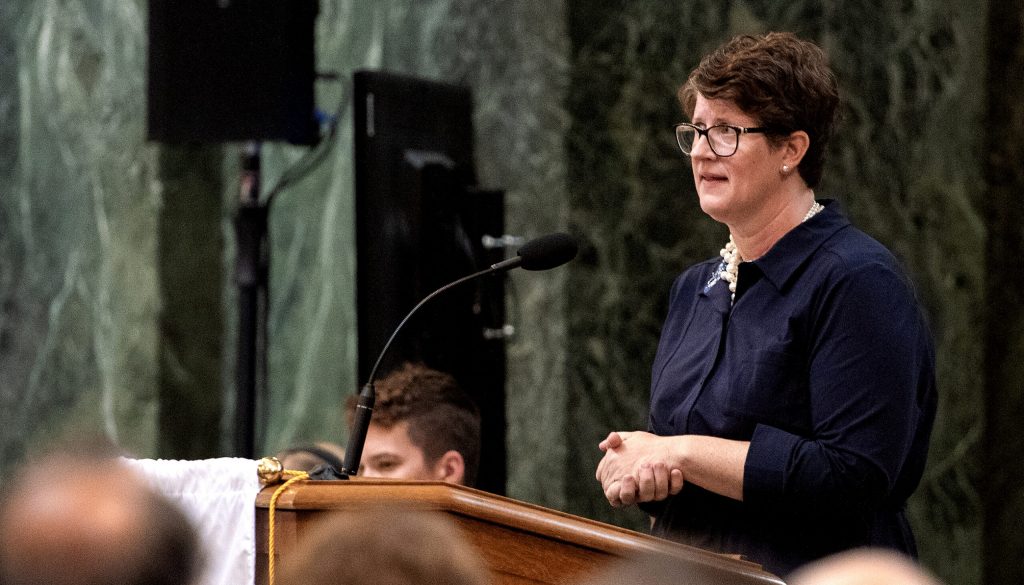Legislative Proposal Would Reverse DPI’s Changes To School Testing
Superintendent Jill Underly criticized for decision to change standards.
A proposal to roll back recent changes to Wisconsin’s test score standards got its first hearing in the state Legislature Thursday.
The Department of Public Instruction’s overhaul of how student achievement on state tests is measured has gotten political blowback from both sides of the aisle.
Under the Republican proposal, DPI would have to use the same benchmark scores, score ranges and corresponding qualitative descriptions that were used on school report cards published in the 2019-20 school year.
“I think we need to have as high standards as possible. I don’t think we should be lowering them,” Jagler said. “That’s not my quote. That’s a quote from Gov. Evers, and I think the sentiment we all can agree on: It was a mistake.”
Evers told reporters in early January there were not enough conversations before the change.
This year, assessment benchmark scores were updated by DPI for the Forward Exam, which is given to students in grades three through eight, and the PreACT Secure and ACT tests.
The terms “below basic,” “basic,” “proficient” and “advanced,” which had been used since 2014, have been replaced with “developing,” “approaching,” “meeting” and “advanced” to describe the skill level on the Forward Exam.
The new standards for the Wisconsin Forward Exam don’t align with the scores with the National Assessment of Educational Progress, or NAEP, test. The change also makes it difficult to compare this year’s Forward Exam scores with previous years.
Jason Stein, who heads the nonpartisan Wisconsin Policy Forum, testified that the change by DPI made it difficult to compare this year’s school district data with past year’s numbers.
The Policy Forum uses Forward Exam data to compare school districts over time and to each other. Stein said having consistent data is important for parents and taxpayers.
“Our goal is that a school board member in a Northwoods district, or a single mother in Milwaukee, or a stay-at-home dad in La Crosse can take this data and they can understand what it means. And they can use it to make better decisions, whether that’s where their child goes to school, how they interact with their school district, or what policies their school district takes on,” Stein said.
DPI has repeatedly said — including in lengthy testimony on Thursday — that standards have not been lowered. Instead, the new scoring illustrates what students should know at every grade level.

State Superintendent Jill Underly speaks Thursday, Sept. 21, 2023, at the Wisconsin State Capitol in Madison, Wis. Angela Major/WPR
Testing top issue in State Superintendent race
The testing standards change has emerged as the top issue in the state superintendent race.
Incumbent DPI Secretary Jill Underly will face challengers Jeff Wright, Sauk Prairie’s superintendent; and Brittany Kinser, an education consultant, in the primary election Feb. 18.
Both Wright and Kinser have cited Undery’s decision to change state testing benchmarks as reasons for running.
Underly did not attend Thursday’s meeting, but her top deputy Tom McCarthy said educational standards had not been lowered “one iota.”
McCarthy said comparing the Forward Exam to NAEP isn’t relevant, because the national test does not have “educational standards” like DPI does.
“NAEP has always been more aggressive, always been more intense, and that is why you’ve seen gaps between performance, not just in Wisconsin, but across every other state in the nation,” McCarthy said.
Assembly committee hears several other proposals
While testing benchmarks was the main focus of the Committee on Education Thursday, the panel held four other public hearings.
Currently, Wisconsin students must have three credits of social studies. The bill would carve out a half credit of that specifically for civics instruction. Previously, Nedweski wanted DPI to develop the curriculum. She said Thursday she would like the school districts to develop their own curriculum.
Other bills being considered include:
- Requiring cursive writing in elementary school,
- Requiring school boards to make textbooks and curriculum available for public inspection,
- Requiring a school board to spend at least 70 percent of its operating budget directly in the classroom.
New proposal could reverse changes to Wisconsin school testing benchmarks was originally published by Wisconsin Public Radio.
If you think stories like this are important, become a member of Urban Milwaukee and help support real, independent journalism. Plus you get some cool added benefits.























It sounds like the changes were made to cover up for our failing school system. They need to be honest and shoot straight with parents, this is the only way to improve student outcomes.
If publicly financed education in Wisconsin is suppose to be honest and shoot straight with parents, then all State funded choice schools need to show report on all of the testing data that the public schools have to. Choice schools have been protected for decades from real accountability by Republican legislators. Regarding civics education, there should be a high school civics test on the Federal and State Constitution that all elected officials need to pass before taking office.
How are text books not currently available for public inspection? The children have them or copies of the pages from them, right?